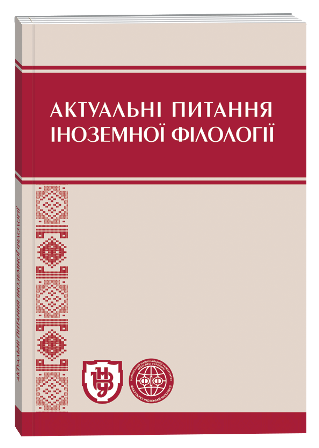ПЕРЕБУДОВА ФОРМИ ТА ЗНАЧЕННЯ МУЛЬТИКОМПОНЕНТНИХ ОДИНИЦЬ
Ключові слова:
мультикомпонентні вербальні одиниці (МВО), модифіковані фігуративні вислови, семантичний зсув, вторинне значення, постсекондарні зміниАнотація
Когнітивна лінгвістика має широкий спектр підходів до опису значень природної мови. У наших дослідженнях ми покладаємося на підходи сучасної фреймової семантики, яка пропонує лінгвістам по-своєму вивчати зміст слів. Існують специфічні способи опису принципів створення нових слів і фраз, а також механізм включення нового значення. У статті розглядаються секондарні та постсекондарні зміни мультикомпонентних одиниць (МКО) в аспекті переформатування їх зовнішньої форми і значення, описаних в термінах їхніх когнітивних сценаріїв. У статті представлена когнітивна модель, яка включає нові, секондарні та постсекондарні значення. Описуються когнітивні сценарії зміни МКО, їх семантична деривація, зміна зовнішньої форми. МКО є частиною «замороженої фразеології» та корелює з когнітивною ендозоною лакунарністю. Семантичні зрушення розглядаються як секондарні та постсекондарні зміни. Первісне значення фразеологічних МКО може бути частково змінене або видалене. У процесі семантичних зрушень фактичне значення змінюється. Модифіковані МКО демонструють мімікрію, але перетворені МКО виявляються абсолютно новими концептуальними одиницями. Інтерпретація схеми перегрупування МКО була проведена за допомогою емпіричних процедур для виділення секундарних і постсекондарних МКО.
Посилання
Altenberg B. On the phraseology of spoken English: the evidence of recurrent word-combinations / B Altenberg // Phraseology: Theory, Analysis, and Applications / A. P. Cowie (ed.). – Oxford : University Press, 1998. – P. 101–122.
Arntz R. Terminological equivalence and Translation / R. Arntz // Terminology: Applications in interdisciplinary communication / ed. by Helmi B. Sonneveld, Kurt L. Loening. – Amtrerdam ; Philadelphia : John Benjamins Publishing Compnay, 1993. – P. 5–21.
Bolly C. The acquisition of phraseological units by advanced learners of French as an L2: High-frequency verbs and learner corpora / C. Bolly // The advanced learner variety: the case of French. – Bern ; Berlin : Peter Lang, 2009. – P. 1–24.
Burt G. Epigenetic change: new from the seeds of the old / G. Burt // Strategic Change. – No. 12(7). – Stirling : Wiley-Blackwell, 2003. – P. 381–393.
Cock S. High Frequency Words: the Bête Noire of Lexicographers and Learners Alike. A close look at the verb “make” in five monolingual learners dictionaries of English / S. Cock, S. Granger // Proceedings of the Eleventh EURALEX International Congress. – Lorient : Universitet de Bretagne-Sud, 2004. – P. 233–243.
Granger S. Integrating learner corpora and natural language processing: A crucial step towards reconciling technological sophistication and pedagogical effectiveness / S. Granger, O. Kraif, C. Ponton, G. Antoniadis, V. Zampa // ReCALL. – Cambridge : Cambridge University Press, 2007. – No. 19(3). – P. 252–268.
Mieder W. Yankee wisdom: American proverbs and the worldview of New England / W. Mieder // Phraseology and Culture in English. –1993. – P. 205–235.
Mieder W. “Yes We Can”: Barack Obama’s Proverbial Rhetoric / W. Mieder. – New York : Peter Lang, 2009. – 352 p.
Pavel S. Neology and Phraseology as Terminology-in-the-Making / S. Pavel // Terminology: Applications in interdisciplinary communication / ed. by Helmi B. Sonneveld, Kurt L. Loening. – Amtrerdam , Philadelphia : John Benjamins Publishing Company, 1993. – P. 21–33.
Szerszunowicz J. Phraseological Gaps as a Translation Problem / J. Szerszunowicz // Research on Phraseology Across Continents. – Bialystok : University of Bialystok Publishing House, 2013. – Vol. 2. – P. 299–319.
##submission.downloads##
Опубліковано
Як цитувати
Номер
Розділ
Ліцензія
Авторське право (c) 2025 Тетяна Анохіна

Ця робота ліцензується відповідно до Creative Commons Attribution 4.0 International License.







